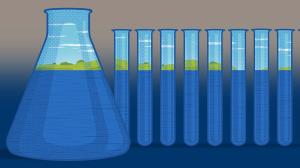
Water Resource Science and Management Specialization
The Specialization builds student expertise in the science, policy, and management of water resources in preparation for careers that call for solutions to challenges posed by the world's emerging and longstanding water-related issues.
On This Page
Students seeking employment within federal and state environmental agencies (e.g., USGS, USEPA, DEP), environmental non-governmental organizations (e.g., WRI, Nature Conservancy), international development agencies, local and interstate watershed commissions, industry, and environmental consulting firms should consider this specialization.
Note that a capstone course used to fulfill the MEM capstone requirement cannot also be used toward fulfilling an MEM Specialization requirement; a capstone course taken once cannot be used to fulfill multiple requirements. Learn more about YSE capstone courses by visiting the MEM Capstone page.
Program Courses
Core
Two courses required.Course 1
Required for all Water Resource Science and Management students.| Course | Fall 2023 | Spring 2024 | Fall 2024 | Spring 2025 |
| ENV 712 Water Management |
Anisfeld Tu,Th 1:00-2:20 |
Anisfeld |
Course 2
Choose one of these two courses.| Course | Fall 2023 | Spring 2024 | Fall 2024 | Spring 2025 |
| ENV 713 Coastal Ecosystems |
Anisfeld W 1:00-5:50 |
|||
| ENV 735 Hydrologic Science for Environmental Managers |
Saiers |
Elective
Students must take at least one course from each category.Management
| Course | Fall 2023 | Spring 2024 | Fall 2024 | Spring 2025 |
| ENV 641 Market-Based Mechanisms for Water Management |
Kruse Th 1:00-3:50 |
Kruse | ||
| ENV 749 Research in Environmental History |
Sabin Tu 9:25-11:15 |
|||
| ENV 820 Land Use Law and Environmental Planning |
Shansky M,W 4:00-5:20 |
|||
| ENV 824 Environmental Law and Policy |
Klee M,W 1:00-2:20 |
Klee | ||
| ENV 828 Risk Assessment & Management: Climate Change |
Wargo Tu 1:00-3:50 |
Wargo | ||
| ENV 834 Environmental Economics and Policy |
Kotchen M,W 9:00-10:20 |
Kotchen | ||
| ENV 840 Climate Change Policy and Perspectives |
Klee M,W 1:00-2:20 |
Klee | ||
| ENV 963 Case Studies in Water Management: Conflict and Cooperation |
Anisfeld Th 2:30-5:20 |
|||
| ENV 971 Land Use Clinic |
Bacher W 10:30-11:50 |
Bacher |
|
EHS 537a / EMD 537a
Water, Sanitation, and Global Health
|
Ying Chen and Michael Cappello |
Science
| Course | Fall 2023 | Spring 2024 | Fall 2024 | Spring 2025 |
| ENV 586 Fisheries & Aquaculture |
Freidenburg Tu,Th 1:00-2:15 |
Freidenburg | ||
| ENV 644 Coastal Environments in a Changing World |
Decker | |||
| ENV 707 Introduction to Environmental Chemistry |
Benoit | |||
| ENV 708 Aquatic Chemistry |
Faculty M,W 1:00-2:20 |
|||
| ENV 713 Coastal Ecosystems |
Anisfeld W 1:00-5:50 |
|||
| ENV 723 Wetlands Ecology, Conservation & Management |
Freidenburg M,W 1:00-2:15 |
Freidenburg | ||
| ENV 725 Water, Energy, and Food Interconnections in a Changing Climate |
Saiers | |||
| ENV 734 Biological Oceanography |
Decker M,W 1:00-2:15 |
|||
| ENV 736 Impacts of Climate Change on Freshwater Ecosystems |
Grimm Tu,Th 5:30-8:20 |
Methods, Tools, and Quantitative Analysis
| Course | Fall 2023 | Spring 2024 | Fall 2024 | Spring 2025 |
| ENV 603 Environmental Data Visualization for Communication |
Queenborough Tu,Th 9:00-10:20 |
Queenborough | ||
| ENV 617 Real World Environmental Data Science |
Grewal M 2:30-5:20 |
Grewal | ||
| ENV 728 Introduction to Statistics and Data Analysis in the Environmental Sciences |
Reuning-Scherer Tu,Th 2:30-3:50 |
|||
| ENV 730 Environmental Data Science in R: Introduction to Data Integration and Machine Learning |
Malone Tu 2:30-5:20 |
Malone | ||
| ENV 753 Regression Modeling of Ecological and Environmental Data |
Gregoire M,W 10:30-11:50 |
Gregoire | ||
| ENV 755 Modeling Geographic Space |
Tomlin Th 1:00-3:50 |
Tomlin | ||
| ENV 756 Modeling Geographic Objects |
Tomlin Th 1:00-3:50 |
Tomlin | ||
| ENV 762 Applied Math for Environmental Studies (AMES):Foundations for Measuring and Modeling Environmental and Socio-environmental Systems |
Fenichel M,W 10:30-11:50 |
Fenichel | ||
| ENV 781 Applied Spatial Statistics |
Gregoire Tu,Th 10:30-11:50 |
Gregoire | ||
| ENV 795 Nature as Capital: Merging Ecological and Economic Models |
Fenichel |
Cross-Over Electives

Learning Community
There is a corresponding “Learning Community” for each specialization, where anyone interested in the topic can find related news, spotlights, colleagues, and events.
Faculty Coordinator
